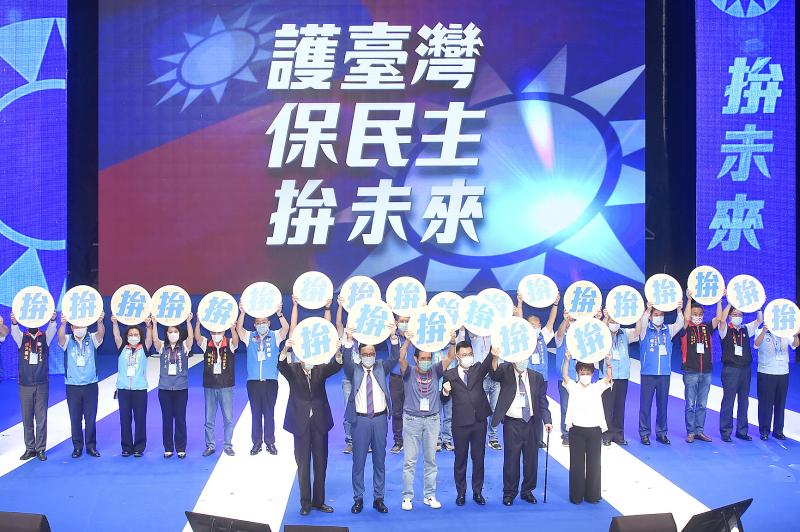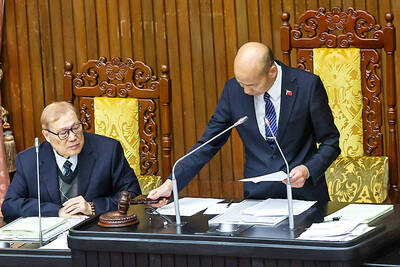The Republic of China (ROC) Constitution is the “rock” for stable cross-strait relations, a Chinese Nationalist Party (KMT) reform committee report presented at the party’s national congress yesterday said, adding that the “1992 consensus” should be applied to maintain cross-strait relations.
The KMT yesterday held its national congress at the Sun Yat-sen Memorial Hall in Taipei. The theme of this year’s congress was “Protect Taiwan, safeguard democracy and fight for the future.”
Following the KMT’s defeat in the Jan. 11 presidential and legislative elections, the party on March 31 established a reform committee that is divided into four groups: financial stability, organizational reform, youth participation and cross-strait discourse.

Photo: Chien Jung-fong, Taipei Times
KMT Deputy Secretary-General Ko Chih-en (柯志恩) delivered the committee report.
The committee advocates the ROC Constitution as the “rock” for stable cross-strait relations, and official cross-strait interactions should “respect the fact that the ROC exists,” the report said, adding that the “1992 consensus based on the ROC Constitution” should be applied to continue cross-strait interaction.
The KMT has for decades “resolutely opposed” Taiwan’s independence and the Chinese Communist Party’s (CCP) “one country, two systems” formula, as both would “eliminate the ROC’s sovereign state status,” it added.
A poll conducted among KMT members on party reform, which was released on Wednesday last week, found that 93.6 percent of respondents supported KMT Chairman Johnny Chiang’s (江啟臣) proposal that “the core value of the KMT is the ROC.”
Increasing membership dues to NT$300 next year, up from NT$200 this year, was among suggestions the committee made in the report.
Another was to limit the term of KMT Central Standing Committee members to one consecutive term, with a maximum term of eight years.
The committee report also proposed that no fewer than 15 percent of KMT Central Committee members be under the age of 40.
One in every five KMT nominees for legislator-at-large seats should be under the age of 40 and have an area of professional expertise, the report said.
In his opening remarks at the congress, Chiang, who won the KMT chairperson by-election on March 7, said he believed that there are two key KMT “traditions.”
“The first one is our core value; in the four simplest words, it is ‘the Republic of China,’” he said.
“The second tradition is the KMT’s continuous reform and introspection in its organization, strategy and practice — constantly innovating and seeking change,” he said.
He listed several developments in the party’s efforts to reform, including the establishment of an international affairs department in April, the resumption of Institute of Revolutionary Practice training sessions in July and the launch of a “digital chapter” on Thursday last week.
The KMT took the opportunity to promote the “digital chapter” — a mobile app that allows users to pay membership dues and participate in polls, among other functions.
“The KMT’s middle-of-the-road, steady policy line has long been a stabilizing force between the two sides” of the Taiwan Strait, Chiang said.
“Facing the current situation, we advocate continuing to promote cross-strait exchanges and dialogue, reversing the malicious spiral toward war and avoiding the recurrence of a cold war,” he said.
Former KMT chairpersons, including former president Ma Ying-jeou (馬英九), former vice president Wu Den-yih (吳敦義) and former New Taipei City mayor Eric Chu (朱立倫), also attended the congress.
The “1992 consensus” — a term former Mainland Affairs Council chairman Su Chi (蘇起) admitted making up in 2000 — refers to a tacit understanding between the KMT and the CCP that both sides acknowledge there is “one China,” with each side having its own interpretation of what “China” means.
Additional reporting by CNA

DEFENDING DEMOCRACY: Taiwan shares the same values as those that fought in WWII, and nations must unite to halt the expansion of a new authoritarian bloc, Lai said The government yesterday held a commemoration ceremony for Victory in Europe (V-E) Day, joining the rest of the world for the first time to mark the anniversary of the end of World War II in Europe. Taiwan honoring V-E Day signifies “our growing connections with the international community,” President William Lai (賴清德) said at a reception in Taipei on the 80th anniversary of V-E Day. One of the major lessons of World War II is that “authoritarianism and aggression lead only to slaughter, tragedy and greater inequality,” Lai said. Even more importantly, the war also taught people that “those who cherish peace cannot

STEADFAST FRIEND: The bills encourage increased Taiwan-US engagement and address China’s distortion of UN Resolution 2758 to isolate Taiwan internationally The Presidential Office yesterday thanked the US House of Representatives for unanimously passing two Taiwan-related bills highlighting its solid support for Taiwan’s democracy and global participation, and for deepening bilateral relations. One of the bills, the Taiwan Assurance Implementation Act, requires the US Department of State to periodically review its guidelines for engagement with Taiwan, and report to the US Congress on the guidelines and plans to lift self-imposed limitations on US-Taiwan engagement. The other bill is the Taiwan International Solidarity Act, which clarifies that UN Resolution 2758 does not address the issue of the representation of Taiwan or its people in

The Philippines yesterday criticized a “high-risk” maneuver by a Chinese vessel near the disputed Scarborough Shoal (Huangyan Island, 黃岩島) in a rare incident involving warships from the two navies. The Scarborough Shoal — a triangular chain of reefs and rocks in the contested South China Sea — has been a flash point between the countries since China seized it from the Philippines in 2012. Taiwan also claims the shoal. Monday’s encounter took place approximately 11.8 nautical miles (22km) southeast” of the Scarborough Shoal, the Philippine military said, during ongoing US-Philippine military exercises that Beijing has criticized as destabilizing. “The Chinese frigate BN 554 was

LEISURE: The new law adds Confucius’ birthday, the anniversary of the Battle of Guningtou, Constitution Day and Little New Year as national holidays The Legislative Yuan yesterday passed new legislation adding four national holidays and making Workers’ Day a national holiday for all sectors. The Chinese Nationalist Party (KMT) and the Taiwan People’s Party used their combined majority in the legislature to push the jointly proposed draft through its third and final reading. This new law supersedes the existing regulations for the implementation of memorial days and state holidays, which are administered by the Ministry of the Interior. The new law recognizes Confucius’ birthday on Sept. 28, the anniversary of the Battle of Guningtou on Oct. 25, Constitution Day on Dec. 25 and “Little New Year,”